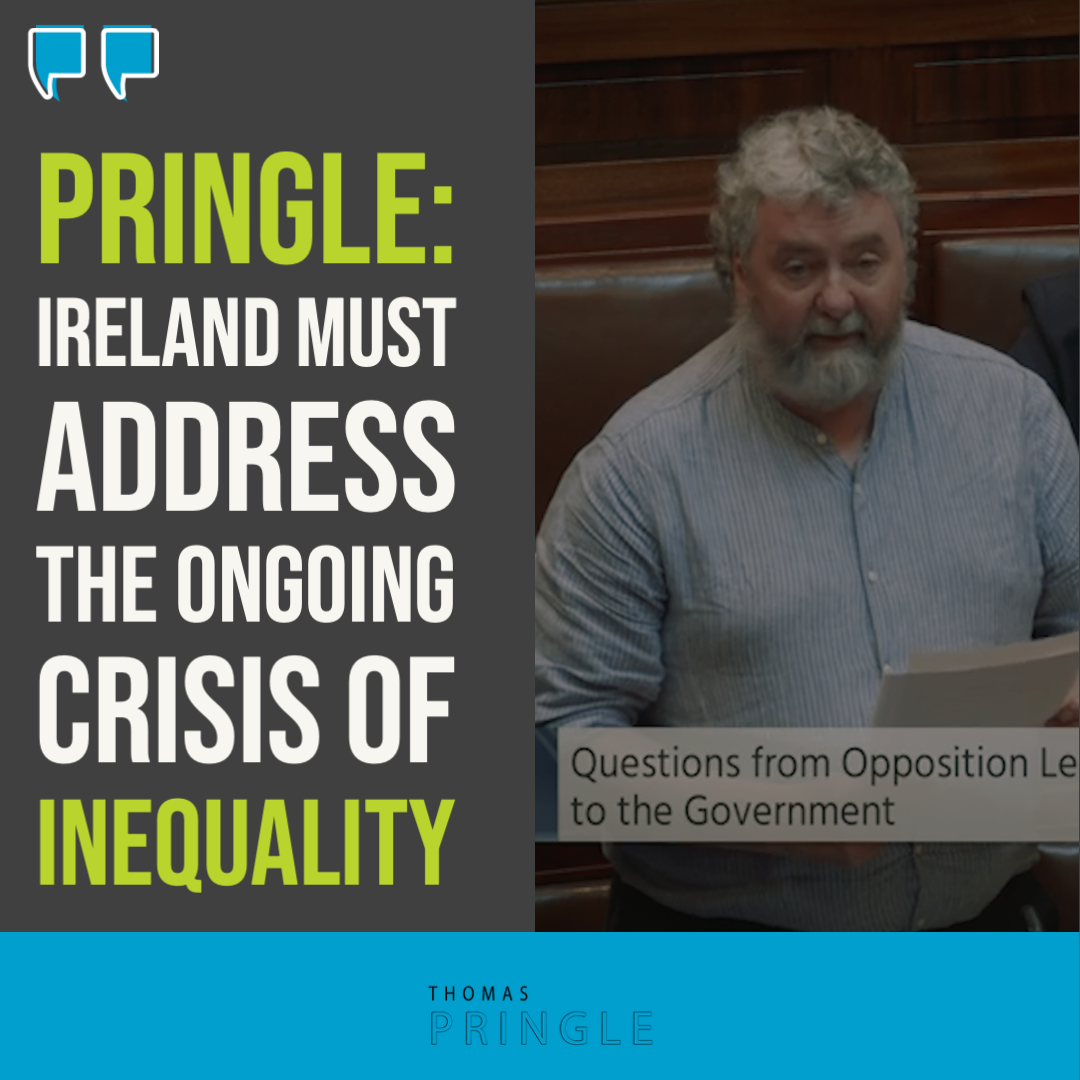- Pringle: We need a policy that recognises the importance of inshore fishing
- Pringle: Disabled people and carers face crisis of State neglect
- Pringle: Failed FF/FG housing policies forcing people to put their lives on hold
- Pringle welcomes Donegal council motion on Occupied Territories Bill: ‘We cannot stand by in the face of genocide’
Pringle: Ireland must address the ongoing crisis of inequality
- Updated: 1st June 2023

Independent TD for Donegal, Thomas Pringle, said future Government policy must prioritise people at the bottom of income distribution, calling inequality the crisis that underpins all others.
Addressing the Dáil today, Deputy Pringle said; “We have had an ongoing crisis for a long time in this country and it is one that has underpinned all other crises: that of inequality.
“Ireland is renowned for its wealth inequality and new data for 2022 shows Ireland maintaining its status as the most unequal country in the EU by market income. The most recent Eurostat data shows that Ireland’s top 20 percent have about 15.5 times the bottom 20 per cent of an income. High rates of income inequality and poverty have sadly become the norm in Irish society. This is an issue that affects the entire country. Recent CSO figures, for example, show earnings in my own constituency of Donegal are still the lowest in the country.
“It is time that we finally address this,” he said. The deputy raised the issue today during Leaders’ Questions.
Deputy Pringle said: “All aspects of Irish life, from employment and healthcare to accommodation and education are rife with inequality. The capitalist system under which we live promotes greed, selfishness and the production of social harms, such as income inequality which then results in significant social divides.
“It is no wonder we are seeing an incredibly fragmented and divided society as of late. The root cause of these social divides, the rise of the far right and the unrest we are seeing amongst communities, is most definitely inequality. Homelessness figures have reached over 12,000 for the first time in our State’s history, while over 166,000 houses in Ireland are vacant, 62,000 houses are second homes and over 15,000 entire homes or apartments in Ireland are listed on Airbnb. This is quite clearly an issue of inequality, Taoiseach, and it is time for the government to acknowledge this,” he said.
Deputy Pringle said: “We have the resources and the wealth to provide that for every single person who lives here and every single person who comes to live here for a better life yet choose not to provide it. Why? Is that the ideology, Taoiseach?”
He said 13.1 per cent of people in Ireland are living in poverty, including over 188,000 children.
The deputy said: “If we don’t tackle this now Taoiseach, these divisions will persist and most likely widen for future generations. Is this the legacy you want to leave? I would ask you to become more open minded in the way you address inequality. Just because we have had the same societal and economic systems in place for years, doesn’t make them better or right.”
He said: “Tackling inequality properly requires a complete overhaul of these systems. But there are also steps we can take in the meantime. Future Government policy must prioritise those at the bottom of the income distribution.
“I support Social Justice Ireland’s calls for the government to increase social welfare payments, ensure equity of social welfare rates and adequate payments for children and to provide a universal state pension, a cost of disability payment and a decent rate of pay for low paid workers.
“My question to you Taoiseach is: What will you do to address inequality in this country and stop the increasing social divide that ongoing failure of government policy has caused?”
In his response, the Taoiseach, Leo Varadkar, acknowledged there were problems. However, he said he did not accept Deputy Pringle’s premise that the country was doing so badly and cited measures that showed Ireland compared well with other countries.
Deputy Pringle said: “You can cherry-pick what you want out of the different measures across the world, but the reality is if we’re doing so well in all those measures why are we doing so badly and why are there over 12,000 people homeless in this country. And the reality is it could be a lot better, and that’s what you’re failing to achieve.”



